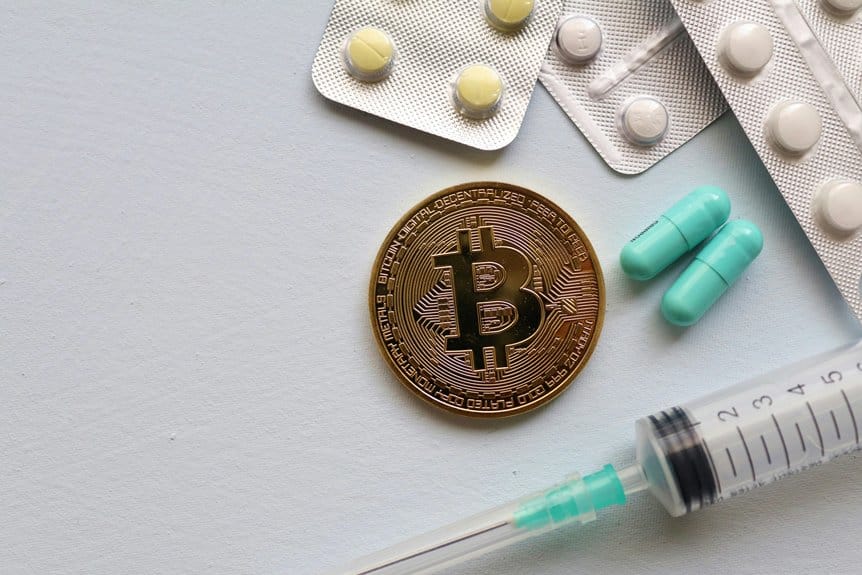Blockchain technology is transforming healthcare through multiple innovative applications. The technology's distributed ledger architecture enables secure, transparent management of patient data while maintaining HIPAA compliance. In supply chain operations, blockchain provides real-time tracking of medical supplies and verification of drug authenticity. Clinical trials benefit from immutable documentation and automated smart contracts for participant management. The technology streamlines claims processing and reduces administrative overhead through automated validation systems. Healthcare data exchange becomes more efficient with blockchain's decentralized structure, enabling seamless interoperability between providers. These foundational changes signal the beginning of blockchain's revolutionary impact on healthcare delivery.
Enhanced Patient Data Security
Healthcare's most critical asset – patient data – requires robust security measures to protect against breaches, unauthorized access, and tampering. Blockchain technology provides an innovative solution by implementing immutable, distributed ledgers that fundamentally transform how medical information is secured and shared.
Through advanced encryption techniques and decentralized architecture, blockchain establishes multiple layers of protection while maintaining data integrity. The system enforces stringent access control mechanisms through smart contracts, ensuring that patient consent is properly documented and honored for each data transaction.
Identity verification protocols authenticate healthcare providers, administrators, and patients before granting access to sensitive information. This approach significantly reduces the risk of data breaches while empowering patients with greater data ownership rights.
Moreover, blockchain's inherent design supports interoperability standards, allowing different healthcare organizations to securely share patient information while maintaining compliance with privacy regulations such as HIPAA.
The technology creates an unalterable audit trail of all data access and modifications, enabling healthcare providers to demonstrate regulatory compliance while facilitating secure information exchange across multiple institutions without compromising data security or patient confidentiality.
Medical Supply Chain Traceability
While blockchain technology strengthens patient data security, its applications extend powerfully into securing the pharmaceutical and medical device supply chain. The decentralized ledger system enables real-time tracking of medical supplies from manufacturer to end-user, creating an immutable record of each transaction and transfer point. This comprehensive documentation helps healthcare organizations combat counterfeit medications and ensure product authenticity through reliable supplier verification protocols.
The technology revolutionizes inventory management by providing unprecedented visibility into supply chain operations. Healthcare facilities can monitor stock levels, expiration dates, and storage conditions with greater accuracy, reducing waste and ensuring optimal inventory levels. The blockchain's smart contract capabilities automate order processing and validate compliance with regulatory requirements, streamlining procurement processes.
Furthermore, blockchain enables rapid response to supply chain disruptions by identifying bottlenecks and verifying alternative suppliers quickly. During recalls, healthcare providers can instantly trace affected products to their source and efficiently remove them from circulation.
This enhanced traceability also supports regulatory compliance by maintaining detailed records of handling conditions, shipping temperatures, and chain of custody throughout the supply chain network.
Clinical Trial Management
Blockchain technology revolutionizes clinical trial management by establishing transparent, tamper-proof documentation of research protocols, participant consent, and study data. This decentralized approach ensures that all stakeholders, including researchers, sponsors, and regulatory bodies, have access to identical, immutable records throughout the trial lifecycle.
The technology creates an auditable trail of all modifications, enhancing accountability and reducing the risk of data manipulation.
The implementation of blockchain streamlines patient recruitment strategies through secure sharing of eligibility criteria and participant databases across multiple research sites. Smart contracts automate participant enrollment, consent verification, and data collection processes, significantly reducing administrative overhead while maintaining regulatory compliance.
This automation helps eliminate duplicate entries and ensures consistent protocol adherence across all trial locations.
Trial data integrity is strengthened through blockchain's cryptographic features, which timestamp and validate each data entry. The system creates permanent records of adverse events, medication adherence, and outcome measurements, making it impossible to alter historical data retroactively.
This enhanced security framework facilitates regulatory submissions and accelerates the verification of trial results, ultimately expediting the drug approval process while maintaining the highest standards of data authenticity.
Smart Contracts in Healthcare
Through the integration of smart contracts, healthcare organizations are revolutionizing traditional administrative processes with self-executing agreements that automatically enforce predefined rules and conditions.
These blockchain-based protocols enable automated consent management, streamline insurance interoperability, and ensure regulatory compliance across healthcare networks. Smart contracts validate and execute transactions without intermediaries, reducing administrative overhead and minimizing errors in patient data management.
The implementation of smart contracts facilitates enhanced patient engagement by providing secure, transparent mechanisms for managing data ownership and access permissions. Healthcare providers can establish automated clinical workflows that trigger specific actions based on predefined criteria, while maintaining billing transparency through immutable transaction records.
The technology enables real-time identity verification, ensuring that only authorized parties can access sensitive medical information or initiate healthcare transactions.
Smart contracts also standardize complex healthcare processes, such as claims processing and provider credentialing, by encoding compliance requirements directly into the contract logic.
This automation reduces processing times, eliminates manual reconciliation efforts, and creates an auditable trail of all interactions, thereby improving operational efficiency while maintaining strict security and privacy standards.
Electronic Health Record Integration
The integration of Electronic Health Records (EHRs) with blockchain technology represents a fundamental advancement in healthcare data management, building upon the automated capabilities of smart contracts. This integration addresses critical interoperability challenges by creating a distributed, immutable ledger that enables seamless data sharing across healthcare providers while maintaining strict security protocols.
The blockchain-based EHR system establishes a standardized format for health records, eliminating compatibility issues between different institutional systems.
Patient consent management becomes more transparent and controlled through blockchain implementation. Patients can grant or revoke access permissions to their medical records through cryptographic keys, ensuring their data sovereignty while facilitating necessary information sharing among healthcare providers. The system maintains a complete audit trail of all access requests and modifications, enhancing accountability and regulatory compliance.
The blockchain-EHR infrastructure also enables real-time updates across all participating nodes, reducing medical errors caused by outdated or incomplete information. Healthcare providers can access comprehensive patient histories instantly, while advanced encryption methods protect sensitive medical data from unauthorized access.
This architecture supports both primary care coordination and clinical research initiatives while maintaining HIPAA compliance and data integrity.
Simplified Claims Processing
While traditional healthcare claims processing often involves multiple intermediaries and time-consuming verification steps, blockchain technology streamlines this process by creating an automated, transparent system for managing insurance claims.
Through automated workflows and smart contracts, claims can be validated and processed in real-time, significantly reducing administrative overhead and processing delays.
Blockchain's distributed ledger technology enhances fraud prevention by maintaining an immutable record of all transactions and verifying patient identity at each step.
This systematic approach ensures billing accuracy while enabling seamless data standardization across different healthcare providers and insurance companies. The technology effectively addresses interoperability challenges by establishing a unified platform where all stakeholders can access and verify claims information.
Insurance transparency improves as blockchain enables real-time visibility into claims status, coverage verification, and payment processing.
Stakeholder collaboration becomes more efficient through shared access to verified information, eliminating redundant documentation and reducing disputes.
The system's ability to automate compliance checks and maintain audit trails further strengthens the integrity of the claims process, ultimately leading to faster reimbursements and reduced operational costs for healthcare providers and insurers.
Drug Safety Authentication
Beyond claims management, blockchain technology provides a robust solution for pharmaceutical supply chain integrity and drug safety verification. The immutable nature of blockchain creates an unalterable record of drug provenance verification, enabling stakeholders to track medications from manufacturer to end-user with unprecedented accuracy. This technology effectively addresses the critical challenge of counterfeit prevention by establishing a transparent chain of custody for pharmaceutical products.
Each transaction in the drug supply chain is recorded as a unique block, containing vital information such as manufacturing date, batch numbers, shipping conditions, and handling requirements.
When combined with IoT sensors and smart contracts, blockchain systems can automatically verify storage conditions and flag potential compromises in drug integrity. Healthcare providers and pharmacies can instantly authenticate medications by scanning product codes, accessing the complete history of the drug's journey through the supply chain.
This technological framework significantly reduces the risk of counterfeit medications entering the legitimate supply chain, ensuring patient safety and maintaining regulatory compliance.
The system's ability to provide real-time verification and automated alerts has proven particularly valuable in managing temperature-sensitive pharmaceuticals and high-value medications.
Decentralized Healthcare Data Exchange
Decentralized healthcare data exchange revolutionizes how medical information flows between providers, patients, and healthcare organizations by leveraging blockchain's distributed ledger architecture. This system enables secure, transparent, and immutable sharing of medical records while maintaining patient privacy and regulatory compliance.
Through smart contracts, patient consent is automatically enforced, ensuring that data access follows predetermined permissions and protocols.
The implementation of interoperability standards within blockchain networks facilitates seamless communication between disparate healthcare systems, eliminating data silos and reducing administrative overhead. Healthcare providers can access comprehensive patient histories across multiple institutions, leading to more informed clinical decisions and improved care coordination.
The system timestamps and validates each transaction, creating an auditable trail of data access and modifications.
This decentralized approach addresses traditional challenges in healthcare data management, including fragmented records, delayed information sharing, and security vulnerabilities. By establishing a unified, tamper-resistant network, blockchain enables real-time data synchronization while empowering patients to maintain control over their medical information.
Healthcare organizations benefit from reduced data reconciliation costs and enhanced compliance with regulatory requirements, ultimately advancing the industry toward more efficient, patient-centered care delivery.
Medical Research Data Management
The application of blockchain technology in medical research data management extends the benefits of decentralized systems beyond patient care into the scientific domain. By implementing blockchain-based solutions, research institutions can establish secure frameworks for data ownership while facilitating seamless research collaboration across geographical boundaries.
The technology addresses privacy concerns through advanced encryption and granular access controls, ensuring regulatory compliance with international research standards. Blockchain platforms enable unprecedented data interoperability between research facilities while maintaining comprehensive audit trails of data usage.
This infrastructure supports patient consent management through smart contracts, allowing subjects to grant, modify, or revoke access to their data for specific research purposes. The system's inherent transparency enables both analytics transparency and funding transparency, providing stakeholders with verifiable records of research methodologies, data manipulation, and financial flows.
The technology's distributed architecture creates tamper-resistant repositories of research data, ensuring the integrity of clinical trials and study outcomes. This framework streamlines the validation of research findings, reduces data silos, and accelerates the pace of medical discoveries while maintaining strict ethical standards and data protection protocols.
Frequently Asked Questions
What Training Do Healthcare Professionals Need to Implement Blockchain Systems?
Healthcare professionals require comprehensive blockchain education covering distributed ledger fundamentals, cryptography basics, smart contract development, and technical skills in data management, security protocols, and blockchain platform operations.
How Much Does Blockchain Implementation Cost for Small Medical Practices?
Small medical practices can expect blockchain implementation costs between $50,000-$150,000, depending on cost analysis factors including infrastructure requirements, vendor selection, staff training, and ongoing maintenance amid implementation challenges.
Can Blockchain Technology Reduce Healthcare Administrative Staff Requirements?
Administrative staffing optimization is achievable through blockchain's automated data processing, smart contracts, and streamlined workflows, enabling efficiency improvements that reduce manual tasks and required personnel across healthcare operations.
Does Blockchain Healthcare Data Storage Comply With International Medical Regulations?
Blockchain healthcare implementations can achieve regulatory compliance through robust data security, consent management, and patient privacy controls, though regulatory challenges and interoperability issues require careful consideration regarding data ownership across jurisdictions.
What Backup Systems Exist if Blockchain Networks Experience Technical Failures?
Blockchain redundancy mechanisms include distributed node backups, automated data recovery protocols, network-wide synchronization, cold storage solutions, and multiple consensus validators ensuring continuous operation during technical disruptions or node failures.
Conclusion
Blockchain technology represents a transformative force in healthcare, offering robust solutions for data security, supply chain integrity, and clinical trial management. The integration of smart contracts, decentralized data exchange, and authenticated drug tracking systems demonstrates significant potential for improving healthcare delivery and operational efficiency. As implementation barriers decrease and adoption increases, blockchain applications will continue to revolutionize healthcare operations, patient care quality, and medical research capabilities.





